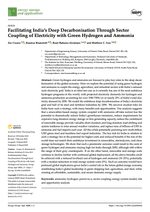Massimiliano Calì and Giorgio Presidente
View Journal Article / Working PaperThis paper provides novel evidence on the economic impact of industrial automation in a large developing economy. To do so it combines labor market and plant-level data from Indonesia in the period 2008-2015 when imports of robots to the country increased rapidly. In contrast to much of the existing evidence, the findings suggest that robotization had an overall positive impact on manufacturing employment in Indonesia. The plantlevel analysis shows that this effect is consistent with automation increasing the efficiency of plants’ operation, which allows them to expand sales and exports. This efficiency effect offsets the labor displacing impact of robots on production workers and raises the demand of plants for domestic inputs. These backward linkages help explain the positive impact of automation on local labor market and may provide a rationale for incentivizing the adoption of industrial robots in manufacturing in Indonesia. The paper provides suggestive evidence on some of the factors that may be behind the positive effects of automation in Indonesia.




